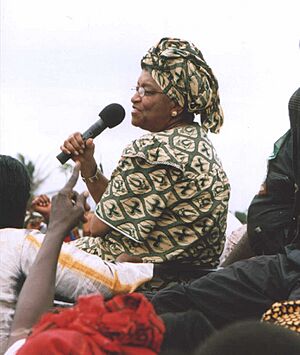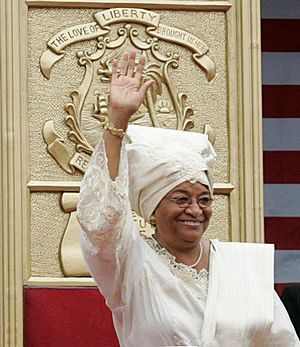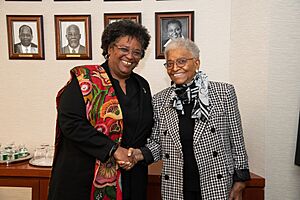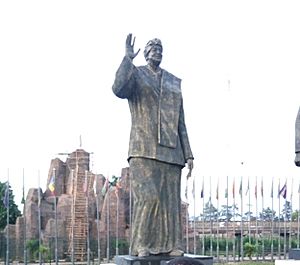Ellen Johnson Sirleaf facts for kids
Quick facts for kids
Ellen Johnson Sirleaf
|
|
|---|---|
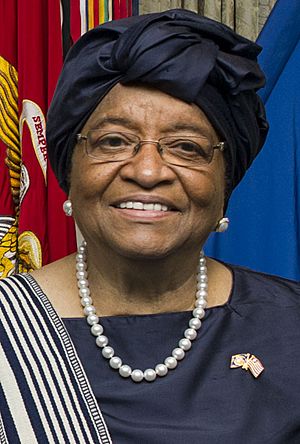
Sirleaf in 2015
|
|
| 24th President of Liberia | |
| In office 16 January 2006 – 22 January 2018 |
|
| Vice President | Joseph Boakai |
| Preceded by | Gyude Bryant |
| Succeeded by | George Weah |
| Minister of Finance | |
| In office 1979 – 12 April 1980 |
|
| President | William Tolbert |
| Preceded by | James T. Phillips Jr. |
| Succeeded by | Perry Zulu |
| In office 1990–1990 |
|
| President | Amos Sawyer |
| Preceded by | Emmanuel Shaw |
| Succeeded by | Stephen Byron Tarr |
| Personal details | |
| Born |
Ellen Eugenia Johnson
29 October 1938 Monrovia, Liberia |
| Political party |
|
| Spouse |
James Sirleaf
(m. 1956; div. 1961) |
| Children | 4 |
| Relatives | Retta (niece) |
| Education |
|
| Awards | Nobel Peace Prize (2011) |
| Signature | |
| Nickname | The Iron Lady of Africa |
Ellen Eugenia Johnson Sirleaf (born 29 October 1938) is a Liberian politician. She served as the 24th President of Liberia from 2006 to 2018. Sirleaf made history as the first elected female head of state in Africa.
She was born in Monrovia, Liberia. Her father was from the Gola people and her mother had mixed Kru and German heritage. Sirleaf studied at the College of West Africa before continuing her education in the United States. There, she attended Madison Business College, the University of Colorado Boulder, and Harvard University.
After her studies, she returned to Liberia. She worked in the government of William Tolbert as Deputy Minister of Finance from 1971 to 1974. Later, she worked for the World Bank in the Caribbean and Latin America. In 1979, she became the Minister of Finance, serving until 1980.
In 1980, Samuel Doe took power in a military takeover. Sirleaf then left Liberia and went to the United States. She worked for Citibank and later the Equator Bank. She returned to Liberia in 1985 to run for a political seat. She was arrested for speaking out against the military government and was sentenced to prison. However, she was later released. Sirleaf continued to be involved in politics. She ran for president in 1997 but came in second place. Charles Taylor won that election.
Sirleaf won the presidential election in 2005 and became president on 16 January 2006. She was re-elected in 2011. As the first woman elected president in Africa, she received the Nobel Peace Prize in 2011. This award recognized her efforts to include women in peace-building. She has also received many other awards for her leadership. In June 2016, Sirleaf was chosen to lead the Economic Community of West African States. She was the first woman to hold this important position.
Contents
Family Background
Sirleaf's father was from the Gola ethnic group. Her mother had a mixed background, with Kru and German ancestors.
Even though she was not of Americo-Liberian ancestry, Sirleaf was seen as culturally Americo-Liberian. This was because her parents grew up in Monrovia, a city with strong Americo-Liberian influence. Sirleaf herself does not identify as Americo-Liberian.
Her father, Jahmale Carney Johnson, was born into a poor Gola family. He was the son of a minor Gola chief. He was sent to Monrovia for school. There, he changed his last name to Johnson. This was out of respect for President Hilary R. W. Johnson. Her father grew up in Monrovia, raised by an Americo-Liberian family. He later became a politician. He was the first Liberian from an indigenous group to be elected to the country's national legislature.
Sirleaf's mother was also born into poverty. Her grandmother sent her to Monrovia when her German husband (Sirleaf's grandfather) had to leave the country. This happened after Liberia declared war on Germany during World War I. A prominent Americo-Liberian family in the capital adopted and raised Sirleaf's mother.
Early Life and Career
Sirleaf was born in Monrovia in 1938. She attended the College of West Africa from 1948 to 1955. She married James Sirleaf when she was seventeen. They had four sons. At first, she was mainly a homemaker. James worked for the Department of Agriculture, and Sirleaf worked as a bookkeeper.
In 1961, she traveled with her husband to the United States. She earned an associate degree in Accounting at Madison Business College in Wisconsin. When they returned to Liberia, Sirleaf worked in the Treasury Department (Ministry of Finance). She and James divorced in 1961.
Sirleaf went back to college to finish her bachelor's degree. In 1970, she earned a BA in economics from the University of Colorado Boulder. She also studied economics and public policy at Harvard Kennedy School from 1969 to 1971. She earned a Master of Public Administration.
She returned to Liberia to work for William Tolbert's government. She was appointed Assistant Minister of Finance. In this role, she spoke out about companies harming the economy. She said they were keeping or sending their profits overseas.
Sirleaf served as Assistant Minister from 1972 to 1973. She resigned after a disagreement about government spending. A few years later, she became Minister of Finance, serving from 1979 to April 1980.
On 12 April 1980, Master Sergeant Samuel Doe took power in a military coup. He ordered the killing of Tolbert and most of his Cabinet. Sirleaf first accepted a job in the new government. However, she left Liberia in November 1980. This was after she publicly criticized Doe's government.
Sirleaf moved to Washington, D.C., and worked for the World Bank. In 1981, she moved to Nairobi, Kenya. There, she became Vice President of the African Regional Office of Citibank. She left Citibank in 1985. She then worked for Equator Bank.
In 1992, Sirleaf became the director of the United Nations Development Programme's Regional Bureau for Africa. She is known internationally as "Africa's Iron Lady" because of her strong political skills. She left this role in 1997 to run for president of Liberia. During her time at the UN, she helped investigate the Rwandan genocide. She also worked on peace-building efforts and the impact of conflict on women.
Political Career
1985 Election and Imprisonment
While working at Citibank, Sirleaf returned to Liberia in 1985. She planned to run for Vice President. However, she was placed under house arrest in August 1985. She was later sentenced to ten years in prison for speaking against the government. After international calls for her release, Samuel Doe pardoned her in September. She was removed from the presidential ticket. Instead, she ran for a Senate seat.
In the 1985 elections, Samuel Doe's party won. Many people said the elections were not fair. Sirleaf was declared the winner of her Senate race. But she refused to accept the seat because of the election fraud.
After an attempted coup against Doe's government in November 1985, Sirleaf was arrested again. She was released in July 1986. She secretly left the country for the United States later that year.
1997 Presidential Campaign
At the start of the First Liberian Civil War in 1989, Sirleaf supported Charles Taylor's fight against Doe. She helped raise money for the war. However, she later disagreed with Taylor's actions during the war.
By 1996, peacekeepers from the Economic Community of West African States (ECOWAS) helped stop the fighting. Liberia held the 1997 general election. Sirleaf returned to Liberia to run for president. She ran for the Unity Party. She came in second place, getting less than 10% of the vote. Charles Taylor won with 75%. After the election, Sirleaf left Liberia and went to Abidjan, Ivory Coast.
2005 Presidential Campaign
After the Second Liberian Civil War ended, a temporary government was set up. Sirleaf was considered a possible leader. Eventually, Gyude Bryant was chosen as chairman. Sirleaf led the Governance Reform Commission.
Sirleaf ran for president again in the 2005 general election. She was the candidate for the Unity Party. In the first round, she came in second behind George Weah, a famous former football player. In the final election, Sirleaf won with 59% of the vote. Weah disagreed with the results.
On 23 November 2005, Sirleaf was declared the winner. She became Liberia's next president and the first woman elected president in an African country. Her inauguration was on 16 January 2006. Many important people attended, including United States Secretary of State Condoleezza Rice.
2011 Presidential Campaign
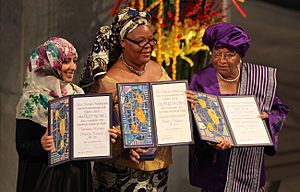
In January 2010, Sirleaf announced she would run for a second term in the 2011 presidential election. Some opposition leaders noted she had promised to serve only one term in her 2005 campaign. Sirleaf was chosen again as the Unity Party's presidential candidate. Her running mate was Vice President Joseph Boakai.
Sirleaf won the Nobel Peace Prize four days before the election. This caused some criticism from other parties. They said the award was "undeserved" and "political interference." Sirleaf said the timing was a coincidence.
In the first round, Sirleaf received 43.9% of the vote. This was more than any other candidate, but not enough to win outright. Tubman came in second with 32.7%. This meant they would have a second round of voting. Tubman called for people to boycott the second round, claiming the first round was unfair. Sirleaf denied this. International observers said the first round was fair. Because of the boycott, Sirleaf won the second round with 90.7% of the vote. However, fewer people voted in the second round.
After the election, Sirleaf announced a "national peace and reconciliation initiative." This was led by Nobel Peace Prize winner Leymah Gbowee. Its goal was to heal divisions in the country. Sirleaf took her presidential oath for her second term on 16 January 2012.
2017 Presidential Campaign
Sirleaf supported George Weah in the 2017 presidential campaign. On 13 January 2018, she and some other officials were removed from the Unity Party. This happened because they did not support the Unity Party's presidential candidate, Joseph Boakai, who was Sirleaf's Vice President.
Presidency
Domestic Policy
On 26 July 2006, a fire damaged the Executive Mansion. An investigation found it was caused by an electrical problem. Sirleaf's government decided that fixing the mansion was not a top priority. She moved her office to the Foreign Ministry building and lived in her own home.
On 26 July 2007, Liberia celebrated its 160th Independence Day. Sirleaf asked 25-year-old Liberian activist Kimmie Weeks to speak. Weeks called for the government to focus on education and health care. A few days later, President Sirleaf made education free and required for all elementary school children.
On 4 October 2010, Sirleaf signed a Freedom of Information bill into law. This was the first law of its kind in West Africa. Because of this, she received the Friend of the Media in Africa Award.
Reducing National Debt
When she became president, Sirleaf promised to reduce Liberia's national debt. In 2006, the debt was about $4.9 billion. The United States was the first country to help. It canceled $391 million owed by Liberia in early 2007. In September of that year, the G-8 countries provided $324.5 million. This helped pay off 60% of Liberia's debt to the International Monetary Fund. They praised Sirleaf's economic policies.
In April 2009, the government successfully reduced another $1.2 billion in foreign debt. They bought back the debt at a very low price. This was possible with money from the International Development Association, Germany, Norway, the United States, and the United Kingdom. This was the largest discount ever for a developing country.
In June 2010, Liberia qualified for full relief from its external debt. The World Bank and IMF agreed to cancel $1.5 billion of Liberia's debt. On 16 September, the Paris Club canceled $1.26 billion. Other countries canceled an additional $107 million. This essentially removed Liberia's remaining foreign debt. Sirleaf promised to prevent future debt. She said annual borrowing would be limited to 3% of the country's GDP. Also, borrowed money would only be used for one-time infrastructure projects.
Truth and Reconciliation Commission
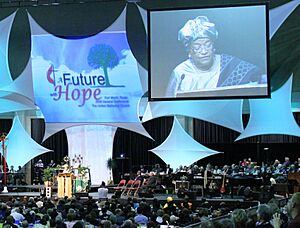
In 2006, the Truth and Reconciliation Commission (TRC) began its work. Its goal was to "promote national peace, security, unity and reconciliation." It investigated over 20 years of civil conflict in Liberia. The TRC was created by a law in 2005.
In its final report in June 2009, the TRC listed 50 people. It suggested they should be banned from public office for 30 years. This was for being "associated with former warring factions." Sirleaf was on this list because she had financially supported Charles Taylor early in the First Liberian Civil War.
On 26 July 2009, Sirleaf apologized to Liberia for supporting Charles Taylor. She said that once she understood his true intentions, she became his strongest opponent. On 28 August, the legislature said they needed time to decide whether to follow the TRC's recommendations.
In January 2011, the Supreme Court ruled on a case. It said that the TRC's recommendation to ban people from public office was unconstitutional. It violated their right to a fair legal process. The court said the government could not implement these bans.
LGBT Rights
In February 2012, a senator proposed a bill to increase the prison term for homosexual activity. A similar bill was introduced in the House of Representatives. On 19 March, Sirleaf spoke about the issue. She said she would not repeal the current law. However, she also would not sign either of the two proposed bills into law. Sirleaf added, "We like ourselves just the way we are... We've got certain traditional values in our society that we would like to preserve."
Her press secretary later clarified her remarks. He stated that there was no specific law referencing homosexuality in Liberia. He also said that the President would veto any new law brought before her regarding homosexuality. The letter added that Liberia had a history of tolerance. No one had been prosecuted under the existing law. It hinted at future discussions on the topic. This suggested that Sirleaf saw the situation as one of tolerance. She did not support making homosexuality legal, but she also refused to support stricter laws.
Foreign Policy
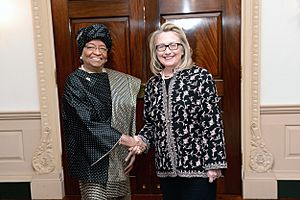
After her election, Sirleaf's first foreign trip was to Ivory Coast. She met with President Laurent Gbagbo to improve relations between the two countries. During a crisis in Ivory Coast (2010–2011), Sirleaf supported recognizing Alassane Ouattara as the winner of the election. However, she did not support a military solution to the crisis.
Sirleaf also built strong ties with the United States. On 15 March 2006, she spoke to the United States Congress. She asked for American support to help Liberia become "an example to Africa and the world."
Sirleaf also strengthened relations with China. China helped Liberia rebuild. They built transmitters for the Liberia Broadcasting System and a new campus for the University of Liberia.
Sirleaf is a member of the Council of Women World Leaders. This group brings together women leaders to work on important issues for women and development.
During the 2011 Libyan civil war, Sirleaf asked Muammar al-Gaddafi to stop the violence. However, she criticized the international military action in Libya. She said that "violence does not help the process." Her government later ended diplomatic ties with Libya. They stated that Gaddafi's government had "lost the legitimacy to govern Libya."
On 27 February 2015, President Sirleaf visited U.S. President Barack Obama at the White House. They discussed ending the Ebola virus epidemic that affected Liberia and other West African countries. They also planned to talk about rebuilding healthcare and other challenges after the outbreak.
Administration and Cabinet
After her 2005 victory, Sirleaf promised to unite the country. She brought opposition leaders into her government. She also appointed several women to important roles. Female ministers led the Ministries of Finance, Law, Commerce, Gender, and Youth and Sports. Sirleaf said she wanted an all-female cabinet but could not find enough qualified women for every position.
Sirleaf promised a "zero tolerance" policy on corruption. However, some critics argued that corruption continued. For example, Information Minister Lawrence Bropleh was fired in 2008 over theft allegations. Internal Affairs Minister Ambullai Johnson, Sirleaf's brother, was dismissed in 2010 after funds disappeared. Sirleaf admitted that corruption remained. She said her focus was on economic reforms, which made it harder to pursue many anti-corruption cases. However, she pointed to the creation of the Liberian Anti-Corruption Commission as a step forward.
On 3 November 2010, Sirleaf dismissed her entire cabinet. She said this was to give her administration a "clean slate" for her final year in office. By early December 2010, she had re-formed her cabinet, replacing seven ministers.
First Cabinet (2006–2012)
| The First Sirleaf Cabinet | ||
|---|---|---|
| Office | Name | Term |
| President | Ellen Johnson Sirleaf | 2006–2012 |
| Vice President | Joseph Boakai | 2006–2012 |
| Minister of Foreign Affairs | George Wallace Olubanke King Akerele Toga McIntosh |
2006–2007 2007–2010 2010–2012 |
| Minister of Finance | Antoinette Sayeh Augustine Kpehe Ngafuan |
2006–2008 2008–2012 |
| Minister of Justice and Attorney General |
Frances Johnson-Morris Philip A. Z. Banks Christiana Tah |
2006–2007 2007–2009 2009–2012 |
| Minister of National Defense | Brownie Samukai | 2006–2012 |
| Minister of Internal Affairs | Ambullai Johnson Harrison Kahnweah |
2006–2010 2010–2012 |
| Minister of Education | Joseph Korto E. Othello Gongar |
2006–2010 2010–2012 |
| Minister of Posts and Telecommunications |
Jackson E. Doe Jeremiah Sulunteh Frederick B. Norkeh |
2006–2008 2008–2010 2010–2012 |
| Minister of Public Works | Willis Knuckles Luseni Donzo Samuel Kofi Woods |
2006 2007–2009 2009–2012 |
| Minister of Agriculture | Christopher Toe Florence Chenoweth |
2006–2009 2009–2012 |
| Minister of Health and Social Welfare |
Walter Gwenigale | 2006–2012 |
| Minister of Information, Culture and Tourism |
Johnny McClain Lawrence Bropleh |
2006 2006–2009 |
| Minister of Planning and Economic Affairs |
Toga McIntosh Amara Mohamed Konneh |
2006–2008 2008–2012 |
| Minister of Lands, Mines and Energy |
Eugene Shannon Roosevelt Jayjay |
2006–2010 2010–2012 |
| Minister of Commerce and Industry |
Olubanke King Akerele Frances Johnson-Morris Miatta Beysolow |
2006–2007 2007–2008 2008–2012 |
| Minister of Gender, Children and Social Protection |
Vabah Gayflor | 2006–2012 |
| Minister of Labor | Samuel Kofi Woods Tiawon Gongloe Vabah Gayflor |
2006–2009 2009–2010 2010–2012 |
| Minister of Youth and Sports |
Jamesetta Howard Wolokollie Etmonia Tarpeh |
2006–2007 2007–2012 |
| Minister of Transport | Jeremiah Sulunteh Jackson E. Doe Alphonso Gaye Willard Russell |
2006–2008 2008–2009 2009–2010 2010–2012 |
| Minister of State for Presidential Affairs |
Morris Dukuly Willis Knuckles Edward B. McClain Jr. |
2006 2006–2007 2007–2012 |
Second Cabinet (2012–2018)
| The Second Sirleaf Cabinet | ||
|---|---|---|
| Office | Name | Term |
| President | Ellen Johnson Sirleaf | 2012–2018 |
| Vice President | Joseph Boakai | 2012–2018 |
| Minister of Foreign Affairs | Augustine Kpehe Ngafuan Marjon Kamara |
2012–2015 2015–2018 |
| Minister of Finance | Amara Mohamed Konneh Boima Kamara |
2012–2016 2016–2018 |
| Minister of Justice and Attorney General |
Christiana Tah Benedict F. Sannoh Frederick Cherue |
2012–2014 2014–2016 2016–2018 |
| Minister of National Defense | Brownie Samukai | 2012–2018 |
| Minister of Internal Affairs | Blamo Nelson Morris Dukuly Henrique Tokpa |
2012–2013 2013–2015 2015–2018 |
| Minister of Education | Etmonia David Tarpeh George Werner |
2012–2015 2015–2018 |
| Minister of Posts and Telecommunications |
Frederick B. Norkeh | 2012–2018 |
| Minister of Public Works | Samuel Kofi Woods Antoinette Weeks Gyude Moore |
2012–2013 2013–2014 2014–2018 |
| Minister of Agriculture | Florence Chenoweth Moses Zinnah |
2012–2014 2014–2018 |
| Minister of Health and Social Welfare |
Walter Gwenigale Bernice Dahn |
2012–2015 2015–2018 |
| Minister of Information, Culture and Tourism |
Lewis Brown Lenn Eugene Nagbe |
2012–2016 2016–2018 |
| Minister of Lands, Mines and Energy |
Patrick Sendolo | 2002–2018 |
| Minister of Commerce and Industry |
Miatta Beysolow Axel Addy |
2012–2013 2013–2018 |
| Minister of Gender, Children and Social Protection |
Julia Duncan-Cassell | 2012–2018 |
| Minister of Labor | Juah Lawson Neto Z. Lighe |
2012–2014 2014–2018 |
| Minister of Youth and Sports |
Tornorlah Vapilah Lenn Eugene Nagbe Saah N'tow |
2012–2013 2013–2016 2016–2018 |
| Minister of Transport | Lenn Eugene Nagbe Angela Cassell Bush |
2012–2013 2013–2018 |
| Minister of State for Presidential Affairs |
Edward B. McClain Jr. | 2012–2016 |
Judicial Appointments
When Sirleaf became president, the entire Supreme Court stepped down. This meant Sirleaf had to choose all five new judges. She nominated Johnnie Lewis as Chief Justice. Lewis and three other nominees were confirmed by the Senate in March 2006. Another nominee, Kabineh Ja'neh, was confirmed in May.
After one judge passed away, Sirleaf nominated Christiana Tah. The Senate rejected her. Sirleaf then nominated Jamesetta Howard Wolokollie, who was confirmed. Another judge retired in 2011. Sirleaf nominated Phillip A. Z. Banks to replace her, and he was confirmed in August 2011.
International Recognition
Forbes magazine named Sirleaf one of the most powerful women in the world in 2006. In 2010, Newsweek listed her as one of the ten best leaders globally. Time magazine also included her among the top ten female leaders. The Economist called her "arguably the best president the country has ever had." In 2010, Sirleaf published her book, This Child Will Be Great: Memoir of a Remarkable Life by Africa's First Woman President.
Life After Politics
In 2018, Sirleaf started the Ellen Johnson Sirleaf Presidential Center for Women and Development. This center aims to empower women across Africa. In 2019, the Director-General of the World Health Organization appointed Sirleaf as a WHO Goodwill Ambassador for the health workforce. During the COVID-19 pandemic in 2020, she stepped down from this role. She became co-chair of the WHO's Independent Panel for Pandemic Preparedness and Response (IPPR). Also in 2020, she joined the Development Advisory Council of the U.S. International Development Finance Corporation.
Ellen Johnson Sirleaf also holds several other positions:
- Africa Europe Foundation (AEF), Member of the High-Level Group of Personalities on Africa-Europe Relations (since 2020)
- Brenthurst Foundation, Member of the Advisory Board
- Mastercard Foundation, Member of the Board of Directors (since 2020)
Personal Life
In 1956, Ellen Johnson married James Sirleaf. They had four sons before they divorced. She grew up as a Presbyterian but later joined her husband's Methodist faith. She has ten grandchildren through her sons.
While in college in the United States, Sirleaf joined the Alpha Kappa Alpha sorority. She is also an honorary member of the Links, Incorporated. She is the aunt of American actress/comedian Retta.
Several of her children worked in the Liberian government. Her son Robert Sirleaf led the National Oil Company of Liberia. Charles Sirleaf held a senior position at the Central Bank of Liberia. Her stepson Fombah Sirleaf led the Liberian National Security Agency.
In December 2021, James Sirleaf, one of Ellen Sirleaf's sons, passed away in Liberia.
Honors and Awards
- 1988 Roosevelt Institute Freedom of Speech Award
- Ralph Bunche International Leadership Award
- Chief of Order of the Golden Heart of Kenya (highest award in Kenya)
- Grand Commander Star of Africa Redemption of Liberia
- 1996 Commander of the Order of Mono
- 2006 Common Ground Award recipient, Search for Common Ground
- 2006 Laureate of the Africa Prize for Leadership for the Sustainable End of Hunger, The Hunger Project
- 2006 Distinguished Fellow, Claus M. Halle Institute for Global Learning, Emory University
- 2006 Honorary Doctor of Laws from Marquette University
- 2006 David Rockefeller Bridging Leadership Award from Synergos
- 2007 Presidential Medal of Freedom, the highest civilian award in the United States, given by U.S. President George W. Bush
- 2008 Golden Plate Award of the American Academy of Achievement
- 2008 Honorary Doctor of Laws degree from Indiana University, Dartmouth College; and Brown University.
- 2009 EITI Award for "rapid progress the country has made towards implementation of the EITI"
- 2009 Honorary Doctor of Humane Letters degree from the University of Tampa
- 2010 Honorary Doctor of Laws degree from Yale University and Rutgers, The State University of New Jersey
- 2010 Friend of the Media in Africa Award from The African Editor's Union
- 2011 Honorary Doctor of Laws degree from Harvard University
- 2011 African Gender Award
- 2011 Nobel Peace Prize
- 2012 Indira Gandhi Prize for Peace, Disarmament and Development
- As of 2014, she was listed as the 70th most powerful woman in the world by Forbes.
- In 2017, she received a title in the Nigerian chieftaincy system from Eze Samuel Ohiri of Imo, Nigeria. She is now the Ada di Ohanma of Igboland.
- 2017 - Recognized as one of the BBC's 100 Women of 2017.
- 2018 Won the 2017 version of the Ibrahim Prize for Achievement in African Leadership
National Honors
Foreign Honors
 France:
France:
 Grand Cross of the National Order of the Legion of Honour
Grand Cross of the National Order of the Legion of Honour
 Ivory Coast:
Ivory Coast:
 Kenya:
Kenya:
 Togo:
Togo:
 United States:
United States:
Other Honors
In 2011, Sirleaf shared the Nobel Peace Prize with Leymah Gbowee of Liberia and Tawakkol Karman of Yemen. They were honored "for their non-violent struggle for the safety of women and for women's rights to full participation in peace-building work."
Sirleaf received the Indira Gandhi Prize from Indian President Pranab Mukherjee on 12 September 2013. In 2016, Forbes magazine listed her as the 83rd-most powerful woman in the world.
Images for kids
See also
 In Spanish: Ellen Johnson-Sirleaf para niños
In Spanish: Ellen Johnson-Sirleaf para niños
 | Emma Amos |
 | Edward Mitchell Bannister |
 | Larry D. Alexander |
 | Ernie Barnes |


